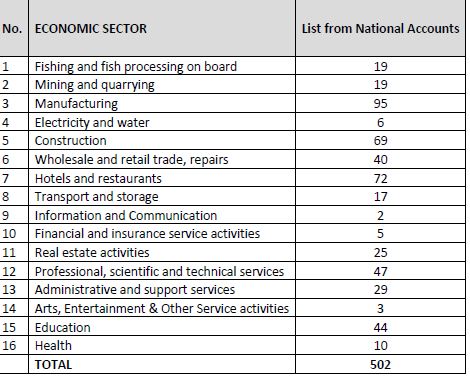
Statistics Agency commences with second round of COVID-19 effects on selected businesses

The Namibia Statistics Agency (NSA) is embarking upon round 2 of a survey of business. The purpose of the survey is to measure the prevalence and nature of adverse effects from COVID-19 experienced by selected businesses operating in Namibia during stage 2 and stage 3 (May 2020 – June 2020).
The agency said the second round survey on perception of businesses started on 28 July to 7 August 2020 and is done in order to have an indication of the effect of COVID-19 on selected sectors of the economy.
The survey will only cover the formal businesses selected from the database of the NSA, according to SG Alex Shimuafeni.
Shimuafeni said convenient sample list of 502 businesses across 16 sectors of the economy will be used for this survey. The NSA maintains a list of businesses selected based on their importance in terms of revenue and output contributions to the economy. This survey list contains contact details i.e. Telephone numbers and emails for companies. In the absence of a Statistical Business Register (SBR), it is the only list available for the survey.
According to Shimuafeni the survey will use a mixed method approach of online and telephone interviews. The link to the questionnaire will be sent to businesses via email addresses to fill-in the online questionnaire. Furthermore, those without emails will be enumerated through telephone. Follow-up of the online questionnaire will be done with telephone calls.
“Edit and validation rules will be built into the questionnaire in order to ensure that responses from respondents are consistent. Enumerators will be trained on how to administer and explain the questionnaire through the telephone. They will be supervised by the Senior Statisticians,” he added.
Meanwhile, for the previous survey results released on 26 May, in general, half of the businesses (50%) indicated that they continued to trade partially. This is followed by 25.2% of businesses that indicated they have temporarily closed while 21.2% of the businesses cited operating at full capacity during the survey period. Only 3.5% of the businesses cited that they were permanently closed.
“In the category of businesses that indicated to trade at full capacity, the ‘Manufacturing ‘sector accounted for 5.8% of the total businesses. On the other hand, the highest percent (5.3%) of businesses that were temporarily closed were recorded in the ‘Hotels and restaurants’ sector followed by Real estate sector (3.5%),” he added.











































